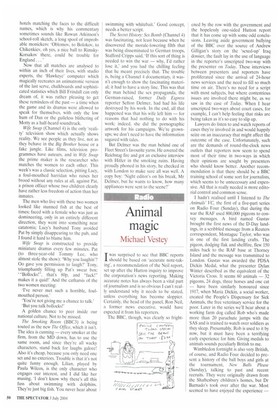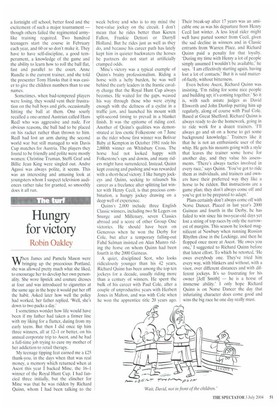Animal magic
Michael Vestey
Iwas surprised to see that BBC reports should be based on 'accurate note-taking', a recommendation of the Neil report, set up after the Hutton inquiry to improve the corporation's news reporting. Making accurate notes has always been a vital part of journalism and is so obvious I can't really understand why it needs to be stated, unless everything has become sloppier. Certainly, the head of the panel, Ron Neil, a former news executive, would have expected it from his reporters.
The BBC, though, was clearly so fright ened by the row with the government and the hopelessly one-sided Hutton report that it has come up with some odd conclusions. Leaving aside government bullying of the BBC over the source of Andrew Gilligan's story on the 'sexed-up' Iraq dossier, the fault lay in the use of language in the reporter's unscripted two-way with the presenter on Today. These interviews between presenters and reporters have proliferated since the arrival of 24-hour news services and the need to fill so much time on air. There's no need for a script with most subjects, but where contentious issues are involved there might be, as we saw in the case of Today. When I hear unscripted two-ways about court cases, for example, I can't help feeling that risks are being taken as it's so easy to slip up.
Lawyers do listen to and watch reports of cases they're involved in and would happily seize on an inaccuracy that might affect the outcome of the case. Unfortunately, such are the demands of round-the-clock news outlets that reporters now seem to spend most of their time in two-ways in which their opinions are sought by presenters who should know better. Another recommendation is that there should be a BBC training school of some sort for journalists, which seems to be unnecessary and expensive. All that is really needed is more editorial control and common sense.
I hadn't realised until I listened to The Animals' VC, the first of a five-part series on Radio Four (Sunday), that during the war the RAF used 800,000 pigeons to convey messages. A bird named Gustav brought the first news of the D-Day landings, in a scribbled message from a Reuters correspondent, Montague Taylor, who was in one of the first landing crafts. The pigeon, dodging flak and shellfire, flew 150 miles back to the RAF base at Thorney Island and the message was transmitted to London. Gustav was awarded the PDSA Dickin Medal, what the presenter Dylan Winter described as the equivalent of the Victoria Cross. It seems 60 animals — 32 pigeons, 24 dogs, three horses and one cat — have been similarly honoured since 1917, when Maria Dickin, a social worker, created the People's Dispensary for Sick Animals, the free veterinary service for the poor. Later in the series we'll hear about a working farm dog called Rob who's made more than 20 parachute jumps with the SAS and is trained to watch over soldiers as they sleep. Presumably, Rob is used to it by now, but it must have been a terrifying early experience for him. Giving medals to animals sounds peculiarly British to me.
Wimbledon fortnight is also very British, of course, and Radio Four decided to present a history of the ball boys and girls at the tournament, New Balls Please (Sunday), talking to past and recent recruits. They were originally drawn from the Shaftesbury children's homes, but Dr Barnado's took over after the war. Most seemed to have enjoyed the experience — a fortnight off school, better food and the excitement of such a major tournament — though others failed the regimented armylike training required. Two hundred teenagers start the course in February each year, and 60 or so don't make it. They have to have self-discipline, a good temperament, a knowledge of the game and the ability to learn how to roll the ball flat, fast and parallel to the court. Anne Rundle is the current trainer, and she told the presenter Tony Hawks that it was easier to give the children numbers than to use names.
Sometimes, when bad-tempered players were losing, they would vent their frustration on the ball boys and girls, occasionally hitting the ball at them. One sourly recalled a one-armed Austrian called Hans Redl who was aggressive and rude. For obvious reasons, the ball had to be placed on his racket rather than thrown to him. Redl had lost an arm during the second world war but still managed to win Davis Cup matches for Austria. The players they found to be friendly and polite were mostly women: Christine Truman, Steffi Graf and Billie Jean King were singled out. Andre Agassi was always polite, it seems. This was an interesting and amusing look at youngsters whom I suspect television audiences rather take for granted, so smoothly does it all run.



































































 Previous page
Previous page